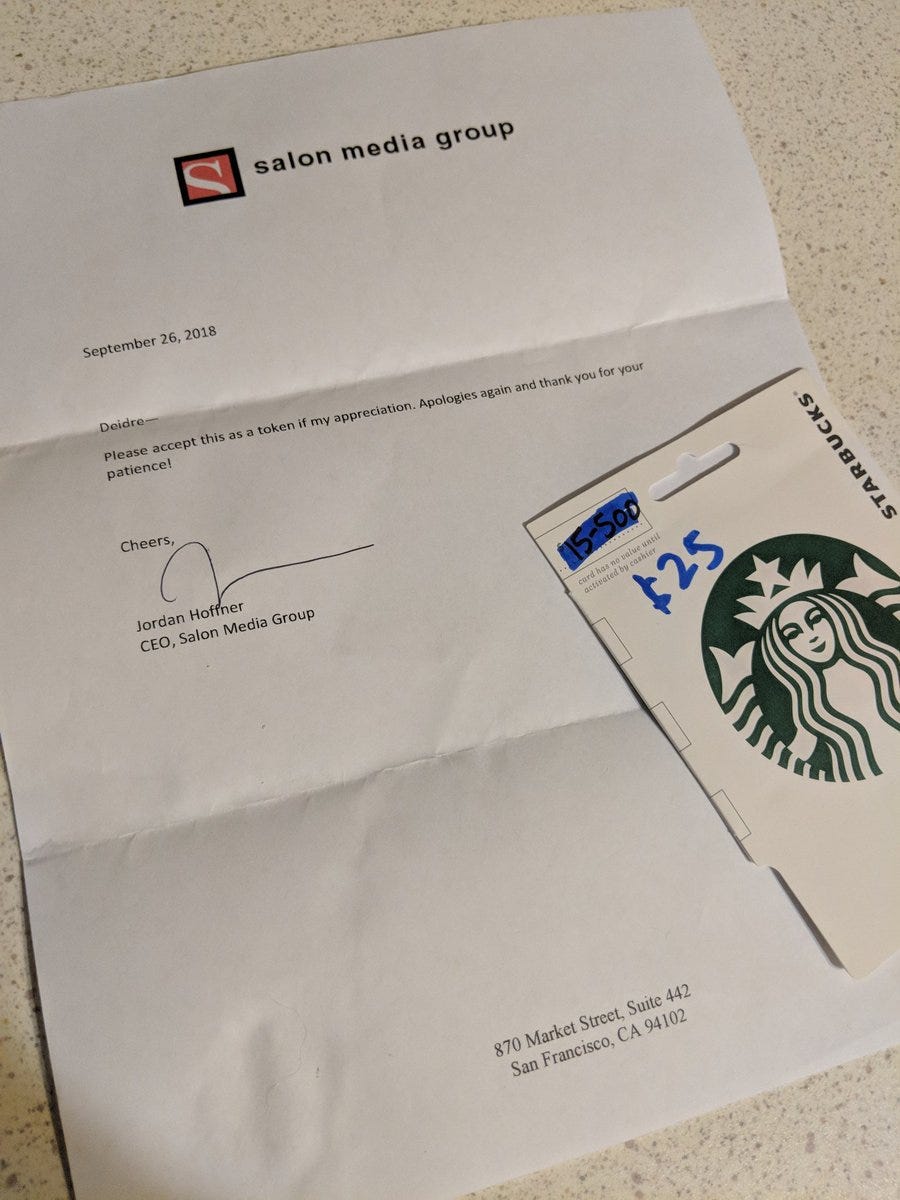I personally don’t give a shit
I think some people have this feeling it’s going to hurt them down the line

In February of this year Deidre Olsen scored the biggest hit of her writing career. A story she wrote for Salon, the aptly titled “Why millennials are making memes about wanting to die,” had rocketed around the web. Shared almost 150,000 times it was a piece that smartly, and with the requisite dark sense of humor, captured the prevailing internet-addled tenor of her “downwardly-mobile” generation “plagued by widespread financial insecurity.”
She wrote three other articles for Salon — the pioneer of digital journalism and stalwart progressive presence on the internet since it was founded in 1995 — in the coming weeks. Then she waited.
By June she realized her payment for the articles — $150 a piece, small even by digital publishing standards — had yet to arrive. She emailed to see what was taking so long and was told that the company was waiting for advertisers to pay them before they would be able to fulfill their own payroll expenses.

Olsen, now a journalism student at the University of Toronto, a not inexpensive city to live in, waited a few more months before her frustration got the best of her. “It was like late August or September and I was like, holy fuck it has that many shares and I’m getting a measly $150 and it’s been like 8 months,” she told me.
In September, after another time-buying reply from Salon saying they didn’t have the funds to pay her yet, she tweeted: “The life of a freelance journalist is writing a viral piece that gets shared on Facebook 145,000 times since February but you still haven't been paid that $150 USD by @Salon.”
The tweet was retweeted almost 3,000 times and liked 8,500 times. Now she finally had amassed the capital — public exposure — that she needed to be taken seriously by the people who were fucking her over. When you’re a freelancer in Hell World the only hope you have to get publications to take you seriously is to publicly shame them to a wide enough audience that they have no other choice than to bite the bullet and give you your fucking money.
“I got really pissed off,” she told me. “I emailed them and they gave me the same bullshit answer I got in June: We will pay you once we get paid by our advertisers. So I decided to drag them on Twitter.”
A source at Salon confirmed to me that the delinquency in payment to freelancers was because they’d been screwed over by advertisers themselves. Small comfort to freelancers like Olsen.
After the tweet started to make the rounds something surprising happened. She got a phone call from Salon CEO Jordan Hoffner.
“The first thing he said was ‘I’m really sorry. I see you work for Dentons. That’s our law firm.’”
It felt like a threat, Olsen said, bringing up her employment at the large law firm. She had just recently quit however.
“He dropped it as soon as I said I don’t work there. He gave me a bunch of bullshit apologies. He basically reiterated what the emails from accounts payable said. He said we’ll pay you. Then he said ‘So, what are you going to do to rectify this? Are you going to keep the tweet up?’”
She kept the tweet up.
Ten days later she was paid the $600, $750 Canadian, or a month’s rent, that she was owed. A week after that she got a letter from Hoffner. Included within was a $25 gift card to Starbucks.

“I screamed at the letter!” Olsen said. “I was like, ‘Oh, wow that’s gonna make me delete the tweet.”
It wasn’t her first time being made to wait to get paid. She’d waited a year and a half to get paid by Brooklyn Magazine, the deadbeat media company we covered here earlier this year.
I asked Olsen if she’d ever write for the site again.
“I’m not going to write for them at this point. I liked writing for them because of their reach, but I don’t have time to write for someone who is not going to pay me. Especially since my day job was directly threatened by the CEO in a passive aggressive message. He told me I shouldn’t have done it online. It’s not economically feasible or good for my mental health for me to write for them again. Unless something changes and they show they’ve taken accountability I wont write for them.”
A friend of hers has been owed $3,200 by Salon for a long time and he won’t speak up because he’s afraid to burn the bridge, she said. In other words, he needs the work from a company that doesn’t care all that much about paying him on time too badly to let it go.
“I think some people don’t want to be perceived as agitators,” she said when I asked why more freelancers don’t speak up like her.
“I personally don’t give a shit. If somebody doesn’t pay me then fuck them. I think some people have this feeling it’s going to hurt them down the line.”
Conor Lynch is another freelancer for Salon who’s been waiting to get paid. When we chatted in early October he was owed $2,650 for articles going back to March. Previously they’d owed him $3,000, but after months of delay they sent him a token $500. He was expecting at least $1,500 he said.
“My contract says I should receive payment 60 days after sending an invoice, so I should have been paid for articles from March-July at this point,” he said. “I’ve contributed there for a couple years now, and they’ve always ended up paying, but they’ve become progressively worse over the past year or so…Not sure what to do at this point, but the CEO has been emailing me thanking me for my patience, so who knows when (if) I’ll be paid in full.”
When we chatted again this month he said he’d gotten a payment for $400 in the meantime.
“The senior accountant told me on Tuesday that they are trying to schedule another payment soon and will let me know in a couple days, but I have yet to hear back.”
I emailed executive editor Andrew O’Hehir to ask for a comment on their delinquency in paying.
“The only response I can make is that we're certainly aware of this issue and I know the folks on the business side are working hard to make it right,” he told me. He directed me to CEO Hoffner, who I spoke with on the phone today, although he wouldn’t answer any questions on the record. Instead he sent me a statement on the matter:
“Salon acknowledges that it has fallen behind in some payments to our valued freelancers due to some unforeseen circumstances. During the past 30 days the company has begun systematically making those overdue payments and will continue to do so at an accelerated pace in this quarter until they are all paid. Note that since November 1 all new freelance work has been paid promptly.”
One of the the things I would have liked to learn more about were we on the record was Salon’s offer earlier this year to readers using ad-blockers to instead allow them to utilize their computing power to mine cryptocurrency. I also would have liked to learn more about reports that they were having trouble paying their rent at their New York office.
Even more specifically I would have liked to know if Hoffner, who in our off the record conversation was very affable and reassuring that he knows how it is out there, man, makes $730,000 a year as reported here on Bloomberg but who knows. He was nice though. He thought I seemed like an aggressive reporter, I don’t think he’ll mind me breaking off the record here to say since it was a personal comment about me and not the issue at hand. Maybe some day I could report for Salon?
Evan Malmgren probably won’t write for them again in any case. He did one piece for Salon three months ago contracted out at $150 payable after 60 days.
“After that period came up I emailed the accounting department asking where it was,” he told me.
“I didn’t get a response.”
“I emailed them several times over a period of a number of weeks. Then I emailed my editor and they sent me a copy-and-pasted stock message saying they are working on advertising revenues and working on paying freelance contracts and didn’t have a timeline. I was upset by then. I’ve been not paid on time from small non-profits to large companies that work with lost of companies. I understand stuff gets lost in the weeds. I have patience if an invoice gets lost.”
He’s being too sympathetic in my opinion. I’ve had invoices “get lost” dozens of times over the years and it has nothing to do with the fact that the people who promised to pay me for my labor were not doing so. What exactly do accounts payable staff do all day by the way?
“What bothered me about it is it seemed like they had made a conscious decision that freelance contracts are optional,” Malmgren went on. “We know we have debt to freelancers and we’re choosing not to pay them. Salon is union and the Writers Guild wouldn’t stand for their workers not getting paid.”
Salon did indeed ratify their union with the Writers Guild of America East last month, some three years after they announced their intention to do so.
I emailed the WGAE to ask whether anything in the unionization agreement mentioned how freelancers are meant to be treated and a representative asked me who I was writing the article for and then he didn’t respond after I said it was likely for Hell World. A source with knowledge of the terms told me there were no protections and considerations for freelancers in the agreement, which is not surprising because there almost never are.
Malmgren emailed Salon asking if he needed to file a small claims court dispute. Even still, like many freelancers, he feels a little abashed about making a stink about a few bucks.
“It’s not a large amount of money or time to wait, and I’m sure there are lots of other freelancers who aren’t getting paid by them. But it’s not right that people should be pulling teeth to get them to fulfill their financial obligations.”
“It’s not like I think Salon is uniquely evil,” he want on. “I understand it’s part of a bigger problem which is that even unionized newsrooms sort of off-shore a lot of the industry’s precarity onto freelancers and tend to think of freelancers like: We don’t need to treat them with the same respect we do staff because they don’t have any collective leverage. They’re powerless and their work depends on sustaining relationships and people don’t feel like they have leverage to stand up for themselves.”
$150 is not a lot of money, he admitted, but that cuts both ways.
“The fact it’s a small amount doesn’t make a contractual agreement optional,” he said. “I live entirely off freelance work. $150 is like a month of groceries.”



